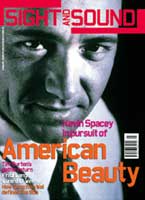Primary navigation

USA 1999
Reviewed by Philip Strick
Our synopses give away the plot in full, including surprise twists.
Released after a nine-year prison term, Cockney criminal Wilson flies to Los Angeles in response to news that his daughter Jenny has been killed in a car accident. Interrogating her friend Ed, Wilson learns she was having an affair with rock promoter Terry Valentine. Attempting to locate Valentine, Wilson is beaten up by thugs apparently associated with him. He shoots them, mystifying Valentine and his security chief Avery.
Acting on information from Jenny's former voice coach Elaine, Wilson gatecrashes a party at Valentine's home, kills a bodyguard and wrecks Avery's car. Avery hires an underworld contact, Stacy, to kill Wilson. Avery, Valentine and Valentine's girlfriend Adhara then retreat to a hideout in Big Sur. Stacy's attack on Wilson and Elaine is thwarted by narcs who reveal Valentine's new location. Wilson finds the place protected by guards. In the ensuing gunfire, complicated by another attack from Stacy, Avery and his various employees kill each other off. Wilson confronts the wounded Valentine on the beach. Recognising that Valentine's relationship with Jenny closely mirrored his own, Wilson leaves and flies back to London.
It was around the middle of filming The Underneath that director Steven Soderbergh admits he lost interest in what he was making. There must have been a brisk mood change because The Underneath is undervalued and something of a treat to watch. But such crises of confidence are surely the secret behind the Soderbergh style, which habitually offers an assortment of disclaimers, distractions and second thoughts. Like most of his leading characters, Soderbergh appears to personify a combination of bravado and vulnerability, two extremes which constantly challenge each other. His protagonists are neither wholly innocent nor irremediably criminal; they are simply trapped by their own fallibility. Which is why the dominating image of Soderbergh's latest film, The Limey, is a wall.
With its montage of flashbacks and flashforwards, images as much from imagination as from memory, The Limey is almost a story that never happened, a fantasy briefly dreamed by airline passenger Wilson, perhaps on his way to Los Angeles, perhaps not. His quest, announced in the darkness punctuating the opening credits, is for knowledge. "Tell me," he says, "about Jenny." The demand is not just for information about his daughter's death but for an understanding of the girl he hasn't seen in nine years. There is now a wall of time and silence between them. Soderbergh fills the screen with it, a towering barricade with Wilson's bowed and labouring figure at its base, heading towards an uncertain turning for as long as it takes. The obstacle reappears as part of the litany of ciphers that flash throughout the film, giving way to less forbidding structures as Wilson achieves progress. Soderbergh has an appreciative eye for angular environments: both Kafka and The Underneath were precisely framed, and The Limey is set against a striking series of elegant confinements until, on the final seashore, the walls have all crumbled.
There is also a satisfying geometry about the relationships in the film, a collection of triangles derived from the matrix represented by Wilson/Valentine (Jenny's lover)/Jenny. As well as the underlying symmetry of two car crashes, there is a near-pedantic matching of Wilson as he arrives and as he departs. One suspects, as Soderbergh goes off at a brief tangent, that his attention has again proved capricious and that the fun of, say, intercutting two bloodied hands (Wilson's and Valentine's) transcends any awkward questions about where the blood came from. He cheerfully whips up a stir of allusions, for example, by filming Wilson through Jenny's former voice coach Elaine's security bars. With singular economy, their unyielding framework represents exclusion, restraint, a reminder of the intruder's criminal background, and, in a wild stretch, the barcodes that are Elaine's stock-in-trade (she moonlights as a checkout girl). Few images are simple when Soderbergh's visual vocabulary is at full volume.
And language itself is a continuing theme: where experiments in French, Italian and Japanese represented attempts for a man and wife to communicate in Schizopolis, words in The Limey are a passport to an era of the Who, the Hollies and other late-60s rock phenomena. "Freedom is a word I rarely use," says Wilson, quoting Donovan to his uncomprehending questioner (who replies: "The thing I don't understand is every word you're saying") while his use of rhyming slang requires frequent - if ponderous - translation. While Terence Stamp and Peter Fonda rest knowingly on their 60s laurels (the concluding extract from Poor Cow, 1967, reprises Donovan but is otherwise more distraction than asset), the film is subtly stolen by Amelia Heinle, joining such actresses as Andie MacDowell, Elisabeth Shue, Betsy Brantley and Jennifer Lopez as the latest in a line of Soderbergh's saving graces.